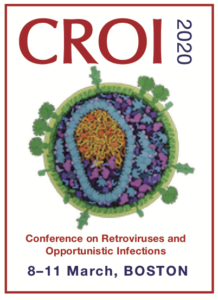CROI 2020: Special session on COVID-19
12 March 2020. Related: Conference reports, Virology, COVID-19: pathogenesis, COVID-19: on the web, CROI 27 (virtual) 2020.
The special session on coronavirus at CROI yesterday is posted for open-access on the CROI website. [1]
The 75-minute overview includes four talks and a Q&A at the end.
A few selected key points include:
- The highest risk of more serious illness and outcomes (risk of dying) are older age (80>70>60 years old), and having other health conditions (heart, lung/breathing, diabetes, cancer). The risk of the most serious outcomes is 5 to 30 times higher than with seasonal influenza (‘flu’).
- Implications for people living with HIV are not currently known, other than as for the general population. One speaker included low CD4 as a possible caution. [Note: Due to lack of evidence so far a low CD4 count has not been included as a risk in the recent UK (BHIVA) statement]. [2]
- Transmission is largely from microdroplets in air from someone during the infectious period (generally from 1 day before symptoms to average 5 days, but up to 14 days after). These can remain infectious on hard surfaces for an unknown time (possibly hours) which is why hand-washing and not touching your face is important.
- Best ways to minimise risk of infection include washing your hands more carefully and frequently and not touching your face.
- Soap and water is better than hand sanitisers (and more readily available).
- Best candidate treatment (so far) is remdesivir (a Gilead compound). This has good activity against a range of viruses in in-vitro studies and is already in at least four large randomised studies.
- Studies with candidate vaccines are expected shortly – within two months of the virus being isolated – fastest time for vaccine development.
- The response in China after the first cases were reported was probably much faster than it would have been in the UK. This included:
– Within four days of the first reported cases, the suspect source was identified and closed (a seafood market).
– Within a week, the new virus was identified (SARS-CoV-2).
– The viral sequence was then shared with WHO and on databases in the public domain for other global scientists to use.
– Within three weeks of the first confirmed cases, Wuhan and 15 other large cities in China were shut down (as part of a programme of containment measures). - One of the questions after the main talks asked whether SARS was now extinct. The answer explained that SARS is a bat virus, and only 50 out of about 1300 species of bats have been studied so far. So SARS is very likely still around.
comment
Currently, the most important things for people living with HIV are:
- To make sure people have enough medications – including at least one month spare. If travelling where there might be a risk of quarantine, to take additional meds with you to cover this.
- As recommended by BHIVA, sensible hygiene precautions (hand washing and not touching your face etc). [2]
- Avoid or delay any non-essential or non-urgent hospital visits.
- Special caution for those who are older or who have multimorbidities – and these are especially prevalent in HIV.
References
- Special session on COVID-19. CROI 2020, 8–11 March 2020.
https://special.croi.capitalreach.com - BHIVA. Comment on COVID-19 from the British HIV Association. 27 February 2020.
https://www.bhiva.org/comment-on-COVID-19-from-BHIVA


 Simon Collins, HIV i-Base
Simon Collins, HIV i-Base